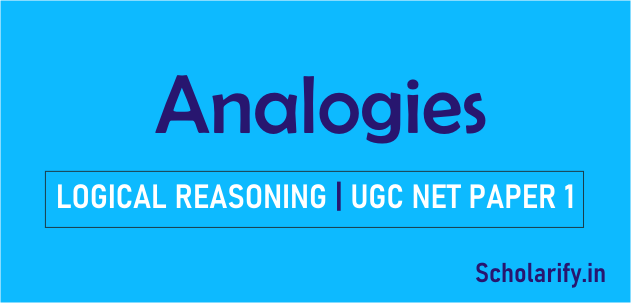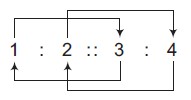
Analogies or analogy basically means similarity of one object to another in certain aspects.
The purpose of analogy is to test the ability to identify the relationship between the pairs of numbers, letters or words.
A given question consists of words, letters or numbers related to each other based on some logic and it is required to identify a word, letter or number analogous to those given in the question.
UGC NET Study Materials for Paper 1 (eBook with MCQ) ⇒ BUY NOW |
The analogical relationship can be established in two ways as follows:
1. Basic Relation: The basic relation can be follow as:

In above illustration, the relation of ‘3’ to ‘4’ or ‘4’ to ‘3’ is in the same pattern as the relation of ‘1’ to ‘2’ or ‘2 to ‘1’
2. Advanced Relation: Th advanced relation is as follows;

Here in the illustration, the relation of ‘2’ to ‘4’ or ‘4’ to ‘2’ is the same as the relation of ‘1’ to ‘3’ or ‘3’ to ‘1’.
For more clarity about the analogical relationship, let us consider the example given below:
Doctor : Hospital : : Teacher : School
After a deeper relationship analysis, we will find the following
A. Doctor:Hospital
A doctor works in a hospital. It means a hospital is a working place for a doctor. Hence, the Doctor and Hospital have a worker and working place relationship.
B. Teacher:School
A teacher works in a school. It means school is the working place for a teacher. Hence, Teacher and School have a worker and working place relationship.
It is observed that in both cases A and B, the relationship is in a similar pattern, that is, the relationship as a worker and working place. Therefore, we can say that the above examples are analogical pairs.
There are several categories of questions under Analogy; Some of them are as follows:
- Analogous Pair Completion
- Analogous Pair Selection
- Direct or Simple Analogy
- Double Analogy
- Similar Word Selection
- Analogy Detection
- Multiple Word Analogy
- Letter Based Analogy (Unit 5- Reasoning)
- Number Based Analogy (Unit 5- Reasoning)
We don’t need to go to a deep study of analogies. The simplest form of questions is asked in UGC NET Exam.
We are here to explain the simplest form of analogical questions only.
Analogous Pair Completion
In this type of question, 2 pairs of words are given, and the words in the first pair are related to each other in a specific way.
For Example: Leaf : Tree : : Page : ?
(a) Forest (b) Root (c) Red (d) Book
Ans. (d) ‘Leaf’ is the part of ‘Tree’ and similarly ‘Page’ is the part of ‘Book.’
Analogous Pair Selection
In this case of analogy, a pair of words is given, which is followed by four pairs of words as options to choose the correct pair.
Example: Introvert: Extrovert
(a) Against : Favour (b) Extreme : Interim (c) Angle : Tangent (d) Action : Law
Ans. (a) Introvert is an antonym of Extrovert. Similarly, Against is an antonym of Favour.
Direct or Simple Analogies
In this case, two words are given, which are related to each other in a particular manner. Another word is given followed by four options. First to identify the relationship between the first two words. Then, to pick that word from the options, which bears the exact same relationship to the third word, as the first two bear.
Example: “Melt” is related to Liquid in the same way as “freeze” is related to
Options: (a) Ice (b) Crystal (c) Water (d) Cubes
Ans. (a) “Melt” is associated with “Liquid” because after melting, we obtain liquid. Similarly, the state of “Water” after freezing is ‘Ice.’
Double Analogies
In this case, 2 words are given on both the left and right side of the sign of double colon (::). On both sides, one of the two words is left out marked as A and B or I and II. The question is followed by four options from which a candidate is required to find out the correct pair of words. The selected pair will make an appropriate analogical relationship between the two words to the left and similarly two words to the right of the sign of double colon (::).
Example: A : Wheat : : Brick : B
Options: (a) A. Bread , B. Clay (b) A. Cereal, B. Clay
(c) A. Farmer, B. Mason (d) A. Farmer, B. Clay
Ans. (a) ‘Wheat’ is used to make ‘Bread’. Similarly, ‘Clay’ isused to make ‘Brick’.
Similar Word Selection
In this types of analogy, a group of 3 or 4 words is given followed by 4 other words as alternatives. Then, have to choose the alternative, which is similar to the given words.
Example: Mumbai: Lucknow : Kolkata
Options: (a) Pune (b) Bikaner (c) Patna (d) Ludhiana
Ans. (c) Mumbai, Lucknow, and Kolkata are the capitals of 3 Indian states. Similarly, Patna is the capital of Bihar.
Analogy Detection
In this analogy, the candidate is required to identify the common feature among the given words and pick the right alternative that mentions the properties common to the given words.
Example: Nose : Eyes : Ears
Options: (a) They are parts of the body below waist
(b) They are not the external part of human body
(c) They are internal part of human body
(d) They are parts of the body above neck
Ans.(d) ‘Nose,’ ‘Eyes,’ and ‘Ears’ are the parts of the human body above the neck.
Multiple Word Analogy
In this case, a group of 3 or 4 inter-related words is given. To solve the analogy, the right group of words is required to choose from the options provided. The relationship among these words should have similar relationships as words inter-related in question.
Example: Furniture : Table : Almirah
Options: (a) Building : Wall : Brick
(b) Fruit : Orange : Apple
(c) Mother : Father : Sister
(d) Sea : Road : City
Ans. (b) ‘Orange’ and ‘Apple’ are both ‘Fruits’ as similar relation of ‘Table’ and ‘Almirah’ with ‘Furniture’.
Related Topics:
UGC NET Syllabus (Updated): Paper 1 and 2
Solved Question Papers of UGC NET Paper 1
UGC NET Study Materials for Paper 1 (Download PDF)
Official Website for UGC NET